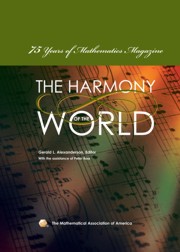Book contents
- Frontmatter
- Introduction
- Contents
- A Brief History of Mathematics Magazine
- Part I The First Fifteen Years
- Part II The 1940s
- Part III The 1950s
- Part IV The 1960s
- Part V The 1970s
- Trigonometric Identities
- A Property of 70
- Hamilton's Discovery of Quaternions
- Geometric Extremum Problems
- Pólya's Enumeration Theorem by Example
- Logic from A to G
- Tiling the Plane with Congruent Pentagons
- Unstable Polyhedral Structures
- Part VI The 1980s
- Briefly Noted
- The Problem Section
- Index
- About the Editors
Pólya's Enumeration Theorem by Example
from Part V - The 1970s
- Frontmatter
- Introduction
- Contents
- A Brief History of Mathematics Magazine
- Part I The First Fifteen Years
- Part II The 1940s
- Part III The 1950s
- Part IV The 1960s
- Part V The 1970s
- Trigonometric Identities
- A Property of 70
- Hamilton's Discovery of Quaternions
- Geometric Extremum Problems
- Pólya's Enumeration Theorem by Example
- Logic from A to G
- Tiling the Plane with Congruent Pentagons
- Unstable Polyhedral Structures
- Part VI The 1980s
- Briefly Noted
- The Problem Section
- Index
- About the Editors
Summary
Editors' Note: Alan Tucker was born into a mathematical family. His grandfather on his mother's side was David Raymond Curtiss, longtime Professor of Mathematics at Northwestern University and author of the second of the MAA's Carus Monographs, Analytic Functions of a Complex Variable (1926). Alan Tucker's father was Albert Tucker, an eminent mathematician at Princeton for many years, and his uncle was John Curtiss of Johns Hopkins and Miami, one-time executive director of the American Mathematical Society. His stepfather was E. F. Beckenbach at UCLA, and his brother is Thomas Tucker, on the faculty at Colgate University. Beckenbach played a role in the rescue of Mathematics Magazine in 1945.
Alan Tucker is a Distinguished Teaching Professor in the Department of Applied Mathematics and Statistics at the State University of New York in Stony Brook. He was an undergraduate at Harvard and took his PhD at Stanford University in 1969, writing his dissertation under the direction of George Dantzig and D. R. Fulkerson. He was also a teaching assistant for George Pólya in a course in combinatorics and was much influenced by him. Here he discusses Pólya's enumeration theorem. This effort may well have been part of planning that went into Tucker's writing his classic text, Applied Combinatorics (Wiley, 1980), which has been one of most popular combinatorics texts over the past couple of decades. His other books include A Unified Introduction to Linear Algebra: Models, Methods, and Theory (Macmillan, 1988) and Linear Algebra (Macmillan, 1994).
- Type
- Chapter
- Information
- Harmony of the World75 Years of Mathematics Magazine, pp. 161 - 168Publisher: Mathematical Association of AmericaPrint publication year: 2007



